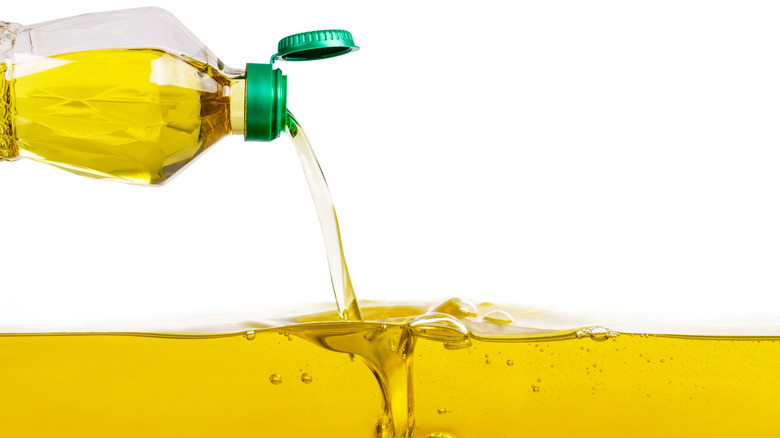Why Sunflower Oil May Not Be As Nutritious As You Think
When it comes to oils, there are tons of options in grocery stores, so it can be pretty difficult to choose the right one. Thanks to social media, most people know about healthy oils such as avocado and olive oil, but not many know about sunflower oil. This oil is a neutral oil that's typically used for sautéeing or stir-frying ingredients, and some people use the cold-pressed variety of sunflower oil for healing wounds or as a skin-protecting barrier (per Healthline).
According to Eating Well, sunflower oil is made by pressing sunflower seeds and does have some health benefits, despite being one of the cooking oils that have the highest smoking point. It's high in vitamin E, a powerful antioxidant that helps in boosting our immune system, and also a good source of an essential fatty acid called linoleic acid, which, per Harvard Health, may lower the risk of heart disease and stroke.
Still, as nutritious as it sounds, sunflower oil may actually pose a danger to your health.
The connection between sunflower oil and health risks
According to a Fox News interview with Jay Cowin, a registered nutritionist and director of formulations for ASYSTEM, sunflower oil is not as healthy as one may think. Cowin says that "sunflower oil is unhealthy because it also contains high levels of Omega-6 fatty acids. These fatty acids can cause inflammation in the body, which can lead to health problems such as heart disease and cancer."
He goes on to explain that the oil also produces aldehyde in larger amounts than some other cooking oils. When exposed to aldehyde, there is an increased risk for health concerns, including irritation of the respiratory tract, skin, and eyes.
It might be hard to accept, but the bottom line is that you're probably using the wrong cooking oil. If you want to avoid the health risks associated with using sunflower oil, you might be better off trying oils made from olives, avocados, or coconut. It's important to remember that different kinds of oils are used in different ways and yield varied results. If you choose to err on the side of caution, your best bet is to research which oil is the most suitable and healthy for the recipe it calls for.

